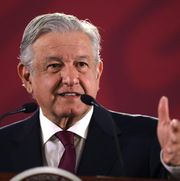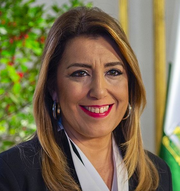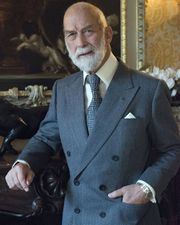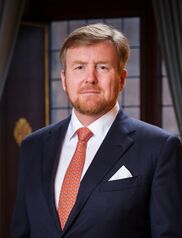More actions
No edit summary |
|||
| (5 intermediate revisions by the same user not shown) | |||
| Line 1: | Line 1: | ||
The '''Lord Keeper of the King's Seal''', commonly referred to as the '''Lord | The '''Lord Keeper of the King's Seal''', commonly referred to as the '''Lord Keeper''', is a senior advisor to the monarch of the [[Balancín Kingdoms]]. In contemporary times, the Lord Keeper is a senior member of the government and usually a member of the [[Balancín Parliament]]. Holders of the office are empowered to use the King's Seal, a representation of his power and authority as King. This has, historically, granted holders significant power within the Kingdom and has led to most Lord Keepers being considered heads of government. Appointed at the discretion of the monarch, the Lord Keeper does not depend on the consent of Parliament. Since the establishment of the [[Balancín Kingdoms]], however, the Lord Keeper is expected to "seek" the confidence of Parliament. | ||
The office was first created in 2665 by a royal charter by [[Alfonso I|King Alfonso I]] and has been held nearly continuously since (with the exception of periods of interregnum). On certain occasions, the | The office was first created in 2665 by a royal charter by [[Alfonso I|King Alfonso I]] and has been held nearly continuously since (with the exception of periods of interregnum). On certain occasions, the Lord Keepers have held different governmental titles alongside being Lord Keeper. The title of Lord President of the King's Council is also one that has held significant weight throughout history. Often, the personality of the respective office holders contributed to which office held more power, as well as who held more sway over the reigning monarch. | ||
Since the establishment of the Balancín Kingdoms, the office of Lord | Since the establishment of the Balancín Kingdoms, the office of Lord Keeper has been considered to be equivalent to that of a prime minister. Many news outlets have reported it as such. The first post-democratic Lord Keeper was Lady Christina De Leon. She was succeeded on 1 January 3024 by the Duke of Mountbatten. | ||
== List of | The office is held currently by Prime Minister [[Stephen Falkner]]. | ||
Since the creation of the office in 2665 there have been 45 | |||
== List of Lord Keepers == | |||
Since the creation of the office in 2665 there have been 45 Lord Keepers. Throughout different periods, the Lord Keepers have held certain political affiliations. Since 3024, alignment to a political party has been illegal within the Balancín Kingdoms. The eras of Lord Keepers represent different eras of political affiliation within the Kingdom. | |||
During the first era (2665 - 2680), is characterised by a generally united court. No major political affiliations arose, despite around specific issues but were rarely consistent across issues. | During the first era (2665 - 2680), is characterised by a generally united court. No major political affiliations arose, despite around specific issues but were rarely consistent across issues. | ||
| Line 14: | Line 16: | ||
The third era started in 2840 with the Crusades to install King Antony Edmund II as King against the Pius Revolution. Despite most direct supporters of Elisa Pius being executed in Antony Edmund's early reign, there were some radical supporters of hers who continued to speak out in Parliament. That minority described themselves as "loyalists" but later became known as the Chequers, a derogatory reference to the game which is considered much simpler and less intelligent than Chess. The Rooks continued to dominate politics for the entire third era and became far more reformist. Many former Whigs became Rooks during this period as King Antony Edmund spearheaded liberal reforms. | The third era started in 2840 with the Crusades to install King Antony Edmund II as King against the Pius Revolution. Despite most direct supporters of Elisa Pius being executed in Antony Edmund's early reign, there were some radical supporters of hers who continued to speak out in Parliament. That minority described themselves as "loyalists" but later became known as the Chequers, a derogatory reference to the game which is considered much simpler and less intelligent than Chess. The Rooks continued to dominate politics for the entire third era and became far more reformist. Many former Whigs became Rooks during this period as King Antony Edmund spearheaded liberal reforms. | ||
The fourth era began with the defeat of the Earl of Win de la Ross in the 2914 general election. Called as the first major mass democratic exercise, Queen Isabel vocally supported the Kingdom's right to choose a democratic leader. After his defeat in the election, she appointed the left-wing radical Marco Winn to the position of Lord | The fourth era began with the defeat of the Earl of Win de la Ross in the 2914 general election. Called as the first major mass democratic exercise, Queen Isabel vocally supported the Kingdom's right to choose a democratic leader. After his defeat in the election, she appointed the left-wing radical Marco Winn to the position of Lord Keeper after his leftist party won a plurality in the election. After this, the Rooks narrowed to become a more traditional, conservative party. Reformers created their own bloc, which became known as the Pawns after the derogatory name given to them by the Rooks. The radicals saw periodic spouts of power in the early 2900s. The fourth era ended in 2986 with the abolition of the monarchy after the Pawns and the Radicals announced support for the republican United Federation of Planets. | ||
The fifth era was the briefest and extended from the re-establishment of the monarchy in 3021 until the establishment of the Balancín Kingdoms in 3023. No political affiliations were used for royal roles and the fifth era represented a time when the office held significantly less political weight, owing to the democratic institutions that still operated within the country. | The fifth era was the briefest and extended from the re-establishment of the monarchy in 3021 until the establishment of the Balancín Kingdoms in 3023. No political affiliations were used for royal roles and the fifth era represented a time when the office held significantly less political weight, owing to the democratic institutions that still operated within the country. | ||
| Line 21: | Line 23: | ||
{| class="wikitable" | {| class="wikitable" | ||
|+The First Era (2665 - 2680) | |+The First Era (2665 - 2680) | ||
! colspan="2" |Lord | ! colspan="2" |Lord Keeper | ||
!Term of office | !Term of office | ||
!Monarch | !Monarch | ||
| Line 43: | Line 45: | ||
{| class="wikitable" | {| class="wikitable" | ||
|+The Second Era (2680 - 2821) | |+The Second Era (2680 - 2821) | ||
! colspan="2" |Lord | ! colspan="2" |Lord Keeper | ||
!Term of office | !Term of office | ||
!Political affiliation | !Political affiliation | ||
| Line 161: | Line 163: | ||
{| class="wikitable" | {| class="wikitable" | ||
|+The Third Era (2840 - 2914) | |+The Third Era (2840 - 2914) | ||
! colspan="2" |Lord | ! colspan="2" |Lord Keeper | ||
!Term of office | !Term of office | ||
!Political affiliation | !Political affiliation | ||
| Line 223: | Line 225: | ||
{| class="wikitable" | {| class="wikitable" | ||
|+The Fourth Era (2914 - 2986) | |+The Fourth Era (2914 - 2986) | ||
! colspan="2" |Lord | ! colspan="2" |Lord Keeper | ||
!Term of office | !Term of office | ||
!Political affiliation | !Political affiliation | ||
| Line 313: | Line 315: | ||
{| class="wikitable" | {| class="wikitable" | ||
|+The Fifth Era (3021 - 3023) | |+The Fifth Era (3021 - 3023) | ||
! colspan="2" |Lord | ! colspan="2" |Lord Keeper | ||
!Term of office | !Term of office | ||
!Monarch | !Monarch | ||
| Line 342: | Line 344: | ||
{| class="wikitable" | {| class="wikitable" | ||
|+The Sixth Era (3023 - present) | |+The Sixth Era (3023 - present) | ||
! colspan="2" |Lord | ! colspan="2" |Lord Keeper | ||
!Term of office | !Term of office | ||
!Political affiliation | !Political affiliation | ||
| Line 351: | Line 353: | ||
|Lady Christina De Leon | |Lady Christina De Leon | ||
|16 August 3023 until 1 January 3024 | |16 August 3023 until 1 January 3024 | ||
| rowspan=" | | rowspan="3" |Rook | ||
|None | |None | ||
| rowspan=" | | rowspan="4" |[[Maximilian II]] | ||
|- | |- | ||
|[[File:The Lord Maekar.jpg|thumb|225x225px]] | |[[File:The Lord Maekar.jpg|thumb|225x225px]] | ||
|Lord Zacarias Maekar, Duke of Mountbatten | |Lord Zacarias Maekar, Duke of Mountbatten | ||
|1 January 3024 until | |1 January 3024 until 12 March 3024 | ||
| | | | ||
* [[The Partial Parliament of 3024]] | * [[The Partial Parliament of 3024]] | ||
|- | |||
|[[File:Alba.jpg|thumb|238x238px]] | |||
|Lord Jon Alba, Duke of Alba | |||
|24 March 3024 until 5 October 3024 | |||
| | |||
* The Partial Parliament of 3024 | |||
* The Splinter Parliament of 3024 | |||
|- | |||
| | |||
|Lord David-Eli Attlee, Lord Attlee | |||
|5 October 3024 until 22 December 3024 | |||
|Knight | |||
| | |||
* The Splinter Parliament of 3024 | |||
|- | |||
| | |||
|Stephen Falkner | |||
|22 December 3024 | |||
|Pawn | |||
| | |||
* The Splinter Parliament of 3024 | |||
| | |||
|} | |} | ||
Latest revision as of 17:13, 22 December 2024
The Lord Keeper of the King's Seal, commonly referred to as the Lord Keeper, is a senior advisor to the monarch of the Balancín Kingdoms. In contemporary times, the Lord Keeper is a senior member of the government and usually a member of the Balancín Parliament. Holders of the office are empowered to use the King's Seal, a representation of his power and authority as King. This has, historically, granted holders significant power within the Kingdom and has led to most Lord Keepers being considered heads of government. Appointed at the discretion of the monarch, the Lord Keeper does not depend on the consent of Parliament. Since the establishment of the Balancín Kingdoms, however, the Lord Keeper is expected to "seek" the confidence of Parliament.
The office was first created in 2665 by a royal charter by King Alfonso I and has been held nearly continuously since (with the exception of periods of interregnum). On certain occasions, the Lord Keepers have held different governmental titles alongside being Lord Keeper. The title of Lord President of the King's Council is also one that has held significant weight throughout history. Often, the personality of the respective office holders contributed to which office held more power, as well as who held more sway over the reigning monarch.
Since the establishment of the Balancín Kingdoms, the office of Lord Keeper has been considered to be equivalent to that of a prime minister. Many news outlets have reported it as such. The first post-democratic Lord Keeper was Lady Christina De Leon. She was succeeded on 1 January 3024 by the Duke of Mountbatten.
The office is held currently by Prime Minister Stephen Falkner.
List of Lord Keepers
Since the creation of the office in 2665 there have been 45 Lord Keepers. Throughout different periods, the Lord Keepers have held certain political affiliations. Since 3024, alignment to a political party has been illegal within the Balancín Kingdoms. The eras of Lord Keepers represent different eras of political affiliation within the Kingdom.
During the first era (2665 - 2680), is characterised by a generally united court. No major political affiliations arose, despite around specific issues but were rarely consistent across issues.
The second era started in 2680 and continued until the Pius Revolution. During the second era, the major political divide was between the conservative Rooks and the liberal Whigs. The divide came during the later reign of King Charles I, when many in court preferred to supplant Queen Elisa I and instead instal her son, Charles, as King. Those who supported the Queen became known as the Rooks, while those who supported Charles became known as the Whigs. Eventually, more conservative minded members of the court coalesced around the Rooks, while liberals became Whigs. The Rook-Whig dichotomy continued until the reign of King John, as Queen Regent Elisa Pius ruled much of the country to the distaste of both Rooks and Whigs.
The third era started in 2840 with the Crusades to install King Antony Edmund II as King against the Pius Revolution. Despite most direct supporters of Elisa Pius being executed in Antony Edmund's early reign, there were some radical supporters of hers who continued to speak out in Parliament. That minority described themselves as "loyalists" but later became known as the Chequers, a derogatory reference to the game which is considered much simpler and less intelligent than Chess. The Rooks continued to dominate politics for the entire third era and became far more reformist. Many former Whigs became Rooks during this period as King Antony Edmund spearheaded liberal reforms.
The fourth era began with the defeat of the Earl of Win de la Ross in the 2914 general election. Called as the first major mass democratic exercise, Queen Isabel vocally supported the Kingdom's right to choose a democratic leader. After his defeat in the election, she appointed the left-wing radical Marco Winn to the position of Lord Keeper after his leftist party won a plurality in the election. After this, the Rooks narrowed to become a more traditional, conservative party. Reformers created their own bloc, which became known as the Pawns after the derogatory name given to them by the Rooks. The radicals saw periodic spouts of power in the early 2900s. The fourth era ended in 2986 with the abolition of the monarchy after the Pawns and the Radicals announced support for the republican United Federation of Planets.
The fifth era was the briefest and extended from the re-establishment of the monarchy in 3021 until the establishment of the Balancín Kingdoms in 3023. No political affiliations were used for royal roles and the fifth era represented a time when the office held significantly less political weight, owing to the democratic institutions that still operated within the country.
The sixth era started upon Maximilian II's establishment of the Balancín Kingdoms in 3023. The ruling Christian Alliance was a broad church party that represented a wide range of Christian monarchists. Once their common goal was achieved, this consensus broke down. The bulk of the moderate party stuck together under the leadership of Christina De Leon. They adopted the historical name "the Rooks" for their faction of status-quo conservative christians. More radical Christians created the Bishops, using the same Chess metaphor as before. Once the Bishops had formed, the naming convention stuck. Liberal democratic reformers chose the historical name "Pawns", and radical socialists became known as "the Chequers". The fifth era continues to this day, though has thus far been dominated by the Rooks.
| Lord Keeper | Term of office | Monarch | |
|---|---|---|---|
| Lord Juan Pius | 5 November 2655 until 19 October 2658 | Alfonso I | |
| Lord Carlos Murcia | 19 October 2658 until 20 October 2660 | ||
| Lord Juan Pius | 20 October 2660 until 4 May 2661 | ||
| 4 May 2661 until 30 October 2680 | Charles I | ||
| Lord Keeper | Term of office | Political affiliation | Monarch | |
|---|---|---|---|---|
| Sir Ricardo Dafydd | 30 October 2680 until 1 November 2685 | Rook | Charles I | |
| Lord Ause Fallon, Duke of Belemadena | 3 November 2685 until 24 November 2691 | Whig | ||
| Lord Vic de Vigo, Earl of Basque | 24 November 2691 until 20 May 2695 | Rook | ||
| Geoffrey Albares | 20 May 2695 until 28 June 2695 | Whig | ||
| Lord Vic de Vigo, Earl of Basque | 28 June 2695 until 1 February 2703 | Rook | Elisa I | |
| Sir Geoffrey Albares | 1 February 2703 until 21 December 2723 | Whig | Charles II | |
| Archbishop Alfonso Ferdinando | 10 January 2724 until 10 January 2729 | Independent | ||
| The Duke of Rajoy | 10 January 2729 until 8 August 2739 | Rook | ||
| 8 August 2739 1 November 2739 | Charles III | |||
| The Lord Aerion | 1 November 2739 until 20 December 2740 | |||
| Sir Geoffrey Albares | 20 December 2740 until 27 July 2745 | Whig | ||
| Sir Eduardo de la Serna | 27 July 2745 until 28 December 2748 | |||
| 28 December 2748 until 26 August 2756 | Philip II | |||
| Sir Enrique Basque | 30 August 2756 until 15 January 2762 | |||
| Prince Robert Martell | 15 January 2762 until 30 January 2762 | |||
| Lord Guillermo Montoro, Duke of Cantabria | 30 January 2762 until 17 July 2780 | Rook | ||
| Lord Pedro de Vigo, Earl of Basque | 17 July 2780 until 1 March 2790 | |||
| Sir Roman Luis | 1 March 2790 until 21 December 2793 | |||
| Bishop Bernardo Swuil | 21 December 2793 until 19 February 2801 | Independent | Oberon | |
| None, direct rule (2801 until 2804) | Antony Edmund I | |||
| Lord Bernat Aido, Earl of Aido | 15 February 2801 until 6 August 2801 | Rook | ||
| 6 August 2801 until 13 January 2802 | Charles IV | |||
| 13 January 2802 until 17 October 2809 | Maximilian I | |||
| Lord Nan Beesbery, Earl of Win de la Ross | 17 October 2809 until 3 March 2817 | |||
| Lord Bernat Aido, Earl of Aido | 3 March 2817 until 26 November 2821 | |||
| Lord Keeper | Term of office | Political affiliation | Monarch | |
|---|---|---|---|---|
| Lieutenant R. A. Grantham | 7 September 2840 until 6 July 2842 | Rook | Antony Edmund II | |
| Finnick Wealsey | 6 July 2842 until 1 January 2859 | |||
| 1 January 2859 until 10 January 2859 | Charles V | |||
| The Lord Solbes | 10 January 2859 until 19 February 2863 | |||
| The Lord Carmichael | 19 February 2863 until 10 March 2863 | |||
| Carme Cose | 10 March 2863 until 19 March 2863 | Chequer | ||
| Lord Gammon Lear, Duke of Mountbatten | 19 March 2863 until 28 December 2870 | Rook | ||
| Carme Cose | 28 December 2870 until 14 January 2871 | Chequer | ||
| Finnick Wealsey | 14 January 2871 until 30 October 2890 | Rook | ||
| Lord Michail Lear, Duke of Mountbatten | 30 October 2890 until 6 October 2899 | |||
| 6 October 2899 until 3 April 2904 | Alfonso II | |||
| Lord Ocam Beesbery, Earl of Win de la Ross | 3 April 2904 until 23 March 2908 | |||
| 23 March 2908 until 4 July 2914 | Isabel | |||
| Lord Keeper | Term of office | Political affiliation | Monarch | |
|---|---|---|---|---|
| Marco Winn | 4 July 2914 until 3 August 2917 | Radical | Isabel | |
| Sir Jordan Van Hoff | 3 August 2917 until 5 September 2917 | |||
| Lord Ocam Beesbery, Earl of Win de la Ross | 5 September 2917 until 1 December 2927 | Rook | ||
| The Lord Urso | 1 December 2927 until 21 November 2934 | Pawn | ||
| Sir Henry Darnton | 21 November 2934 until 1 May 2940 | |||
| Maximiliano Martinez | 1 May 2940 until 31 January 2941 | Radical | ||
| Lord Trent de Vigo, Earl of Basque | 31 January 2941 until 17 April 2941 | Rook | ||
| 17 April 2941 until 13 January 2942 | Philip III | |||
| Lord Gerard Calvo, Duke of Belemadena | 14 January 2942 until 30 June 2948 | |||
| Maximiliano Martinez | 30 June 2948 until 1 March 2951 | Radical | ||
| Lord Tristan Maekar, Duke of Mountbatten | 1 March 2951 until 6 July 2961 | Rook | ||
| Maximiliano Martinez | 6 July 2961 until 16 August 2965 | Radical | ||
| Lord Tristan Maekar, Duke of Mountbatten | 16 August 2965 until 23 October 2969 | Rook | ||
| The Lord Adolfo | 23 October 2969 until 23 October 2975 | Pawn | ||
| The Lord Moore | 23 October 2975 until 9 January 2976 | |||
| 9 January 2976 until 1 May 2980 | Charles VI | |||
| Sir Orazio Schillaci | 1 May 2980 until 21 September 2983 | Rook | ||
| Alfredo Dafydd Mantovano | 21 September 2983 until 4 February 2986 | Radical | ||
| Lord Keeper | Term of office | Monarch | |
|---|---|---|---|
 |
Emiliano Matias Alejandro | 8 March 3021 until 11 June 3021 | Charles VI |
 |
Prince Brandon Blackfyre | 11 June 3021 until 14 June 3021 | |
| Prince Antony Caliban (later the Prince Regent) | 14 June 3021 until 6 September 3022 | Mary | |
| Sir Michael Rodean | 6 September 3022 until 29 May 3023 | Maximilian II | |
| Prince Antony Caliban, Duke of Sinacras | 29 May 3023 until 27 July 3023 | ||
| Lord Keeper | Term of office | Political affiliation | Parliament | Monarch | |
|---|---|---|---|---|---|
 |
Lady Christina De Leon | 16 August 3023 until 1 January 3024 | Rook | None | Maximilian II |
 |
Lord Zacarias Maekar, Duke of Mountbatten | 1 January 3024 until 12 March 3024 | |||
 |
Lord Jon Alba, Duke of Alba | 24 March 3024 until 5 October 3024 |
| ||
| Lord David-Eli Attlee, Lord Attlee | 5 October 3024 until 22 December 3024 | Knight |
| ||
| Stephen Falkner | 22 December 3024 | Pawn |
|
||
